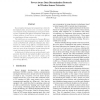Free Online Productivity Tools
i2Speak
i2Symbol
i2OCR
iTex2Img
iWeb2Print
iWeb2Shot
i2Type
iPdf2Split
iPdf2Merge
i2Bopomofo
i2Arabic
i2Style
i2Image
i2PDF
iLatex2Rtf
Sci2ools
147
click to vote
IPPS
2006
IEEE
2006
IEEE
Power-aware data dissemination protocols in wireless sensor networks
Recent rapid technological developments have led to the development of tiny, low-power, low-cost sensors. Such devices integrate sensing, limited data processing and communication capabilities.The effective distributed collaboration of large numbers of such devices can lead to the efficient accomplishment of large sensing tasks. This talk focuses on several aspects of energy efficiency. Two protocols for data propagation are studied: the first creates probabilistically optimized redundant data transmissions to combine energy efficiency with fault tolerance, while the second guarantees (in a probabilistic way) the same per sensor energy dissipation, towards balancing the energy load and prolong the lifetime of the network. A third protocol (in fact a power saving scheme) is also presented, that directly and adaptively affects power dissipation at each sensor. This “lower level” scheme can be combined with data propagation protocols to further improve energy efficiency.
Data Propagation | Distributed And Parallel Computing | Energy Efficiency | IPPS 2006 | Sensor Energy Dissipation |
Related Content
| Added | 11 Jun 2010 |
| Updated | 11 Jun 2010 |
| Type | Conference |
| Year | 2006 |
| Where | IPPS |
| Authors | Sotiris E. Nikoletseas |
Comments (0)

